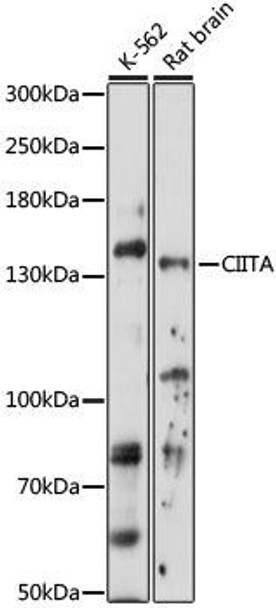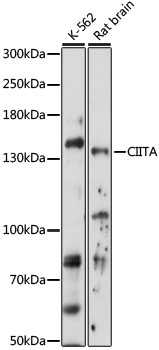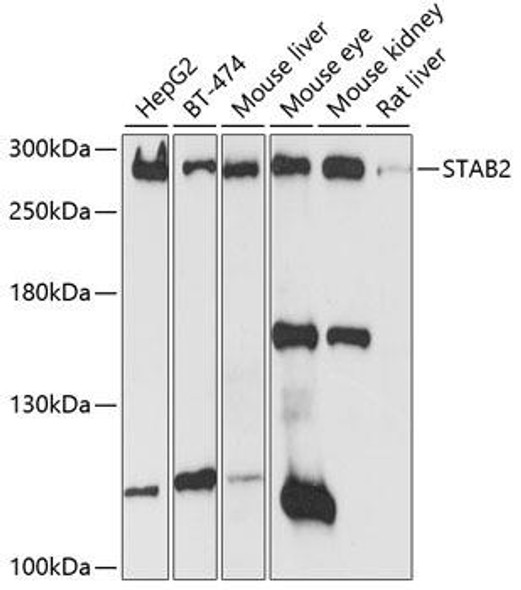Anti-CIITA Antibody (CAB16401)
- SKU:
- CAB16401
- Product type:
- Antibody
- Reactivity:
- Human
- Rat
- Host Species:
- Rabbit
- Isotype:
- IgG
- Antibody Type:
- Polyclonal Antibody
- Research Area:
- Epigenetics and Nuclear Signaling
Description
| Antibody Name: | Anti-CIITA Antibody |
| Antibody SKU: | CAB16401 |
| Antibody Size: | 20uL, 50uL, 100uL |
| Application: | WB |
| Reactivity: | Human, Rat |
| Host Species: | Rabbit |
| Immunogen: | A synthetic peptide corresponding to a sequence within amino acids 650-750 of human CIITA (NP_000237.2). |
| Application: | WB |
| Recommended Dilution: | WB 1:500 - 1:2000 |
| Reactivity: | Human, Rat |
| Positive Samples: | K-562, rat brain |
| Immunogen: | A synthetic peptide corresponding to a sequence within amino acids 650-750 of human CIITA (NP_000237.2). |
| Purification Method: | Affinity purification |
| Storage Buffer: | Store at -20°C. Avoid freeze / thaw cycles. Buffer: PBS with 0.02% sodium azide, 50% glycerol, pH7.3. |
| Isotype: | IgG |
| Sequence: | LDSP PGAL AELA KLAW ELGR RHQS TLQE DQFP SADV RTWA MAKG LVQH PPRA AESE LAFP SFLL QCFL GALW LALS GEIK DKEL PQYL ALTP RKKR PYDN W |
| Gene ID: | 4261 |
| Uniprot: | P33076 |
| Cellular Location: | Nucleus, PML body |
| Calculated MW: | 59kDa/96kDa/101kDa/123kDa |
| Observed MW: | 150kDa |
| Synonyms: | CIITA, C2TA, CIITAIV, MHC2TA, NLRA |
| Background: | This gene encodes a protein with an acidic transcriptional activation domain, 4 LRRs (leucine-rich repeats) and a GTP binding domain. The protein is located in the nucleus and acts as a positive regulator of class II major histocompatibility complex gene transcription, and is referred to as the "master control factor" for the expression of these genes. The protein also binds GTP and uses GTP binding to facilitate its own transport into the nucleus. Once in the nucleus it does not bind DNA but rather uses an intrinsic acetyltransferase (AT) activity to act in a coactivator-like fashion. Mutations in this gene have been associated with bare lymphocyte syndrome type II (also known as hereditary MHC class II deficiency or HLA class II-deficient combined immunodeficiency), increased susceptibility to rheumatoid arthritis, multiple sclerosis, and possibly myocardial infarction. Several transcript variants encoding different isoforms have been found for this gene. |
| UniProt Protein Function: | CIITA: a non-DNA binding transactivator that functions both in constitutive and inducible MHC Class II expression. Defects are a cause of bare lymphocyte syndrome type II (BLS II), a form of severe combined immunodeficiency disease (SCID) characterized by a profound defect in constitutive and interferon-gamma induced MHC II expression, an absence of cellular and humoral T-cell response to antigen challenge, hypogammaglobulinemia and impaired antibody production. |
| UniProt Protein Details: | Protein type:DNA-binding; Transcription, coactivator/corepressor; EC 2.7.11.1 Chromosomal Location of Human Ortholog: 16p13 Cellular Component: nucleoplasm; PML body Molecular Function:protein C-terminus binding; protein binding; DNA binding; GTP binding; transcription activator binding; transcription coactivator activity; transferase activity, transferring acyl groups; protein complex binding; kinase activity; ATP binding Biological Process: response to antibiotic; transcription, DNA-dependent; positive regulation of transcription, DNA-dependent; negative regulation of collagen biosynthetic process; cytokine and chemokine mediated signaling pathway; positive regulation of MHC class II biosynthetic process; positive regulation of MHC class I biosynthetic process; positive regulation of transcription from RNA polymerase II promoter; immune response; negative regulation of transcription from RNA polymerase II promoter; negative regulation of transcription, DNA-dependent; phosphorylation Disease: Rheumatoid Arthritis; Bare Lymphocyte Syndrome, Type Ii |
| NCBI Summary: | This gene encodes a protein with an acidic transcriptional activation domain, 4 LRRs (leucine-rich repeats) and a GTP binding domain. The protein is located in the nucleus and acts as a positive regulator of class II major histocompatibility complex gene transcription, and is referred to as the "master control factor" for the expression of these genes. The protein also binds GTP and uses GTP binding to facilitate its own transport into the nucleus. Once in the nucleus it does not bind DNA but rather uses an intrinsic acetyltransferase (AT) activity to act in a coactivator-like fashion. Mutations in this gene have been associated with bare lymphocyte syndrome type II (also known as hereditary MHC class II deficiency or HLA class II-deficient combined immunodeficiency), increased susceptibility to rheumatoid arthritis, multiple sclerosis, and possibly myocardial infarction. Several transcript variants encoding different isoforms have been found for this gene. [provided by RefSeq, Nov 2013] |
| UniProt Code: | P33076 |
| NCBI GenInfo Identifier: | 218511957 |
| NCBI Gene ID: | 4261 |
| NCBI Accession: | P33076.2 |
| UniProt Secondary Accession: | P33076,Q29675, Q8SNB8, Q96KL4, A0N0N9, D3DUG0, E9PFE0 |
| UniProt Related Accession: | P33076 |
| Molecular Weight: | Predicted: 124 kDaObserved: 125 kDa |
| NCBI Full Name: | MHC class II transactivator |
| NCBI Synonym Full Names: | class II, major histocompatibility complex, transactivator |
| NCBI Official Symbol: | CIITA |
| NCBI Official Synonym Symbols: | C2TA; NLRA; MHC2TA; CIITAIV |
| NCBI Protein Information: | MHC class II transactivator; NLR family, acid domain containing; MHC class II transactivator type III; nucleotide-binding oligomerization domain, leucine rich repeat and acid domain containing |
| UniProt Protein Name: | MHC class II transactivator |
| Protein Family: | MHC class II transactivator |
| UniProt Gene Name: | CIITA |
| UniProt Entry Name: | C2TA_HUMAN |








